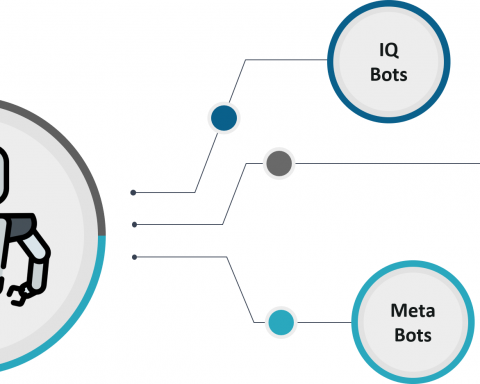Motivation
Well, if you’re working in a company where you have to perform a lot of business processes every day in the same routine then you can better understand the pain behind that. What if all those processes get automated, then imagine the time and effort you can spend on other creative tasks. Tasks like collect email attachments, Extract PDF Data and Copy to Excel, Log Excel Data into Web-based Forms or Send out conform process completion via emails are few that many of us may need to perform on daily basis.
So, what if we train robots to do the same work faster and better? Software bots can train to do our repetitive daily tasks. Now we have RPA – Robotic Process Automation that automates your daily business processes that occupy most of our day at work.
All we have to do is to simply train the bot to perform the required things and deploy, and that’s it. The bot would easily do that tasks like pick up attachments from the inbox, save pdf doc into a separate folder. Similarly, it can complete the business process by sending emails.
What is RPA?
So, RPA is a feature of intelligent process automation (IPA), a way to automate repetitive and rule-based processes. It records actions a human does to complete a computer-based process and then replicates those actions as many times as necessary, error-free and fast.
Hence Employees can focus on processes that required creativity, judgment, and personal interaction.

How it Works!
RPA can help to enhance our process significantly.
- It includes features that faster the fast work. It has features to create and run processes quickly and effectively. Among these features like drag and drop commands and clean friendly interface.
- It is quick to implement and scale. Users can be up and running automating processes, literally in minutes. And ease of use lenses its self in rapid adoption throughout an organization by both business and IT users.
- It is non-invasive, instead of messing with custom programming or direct interaction coding, in RPA platform it integrates with the front end, easy to set up and smooth passaging b/w systems.
- It can easily navigate to the different digital landscape, it adjusts itself in changing environments, movement in icons or buttons, differences in screen sizes and a host of other variants.
- It built for complexity, make things easier where thousands of lines of code used. It made for enterprise, the best use is when it uses at the enterprise level.
- It is easy to integrate with other systems. Users would be able to create automated processes that utilize all of their line of business systems without a single hiccup.

Business Benefits
Well, if we talk about the business benefits of RPA then this is the tool that is going to change a lot of things in our daily business processes including the following;
- Decreased cycle times and improved throughput;
- Bots can perform processes faster than humans can. Make the 24/7 operation possible. Hence save a lot of costs.
- Flexibility and Scalability;
- Once a process has been defined as the series of instructions that a bot can execute, it can be scheduled for a particular time, thus as many bots as required can be quickly deployed to perform it, equally, bots can be easily reassigned when other important processes arise.
- Improved Accuracy;
- Bots are the programs to follow rules, they don’t make typos. As there are lesser human interventions, the possiblity of errors is also low.
- Improved Employee Morale;
- Processes more suitable for automation typically the most burden and least enjoyed. Employees relief from that can more focus on rewarding and high-value activities.
- Detailed data capture;
- Processes performed by a bot can be monitored and recorded at every step, producing valuable data and audit trail.

RPA helps complete a “Digital Workforce”
RPA bots rapidly deliver the next wave of productivity improvement to business process operations.
- They supply processing capacity to meet the demand that is spiky or cyclical in nature, such as a high volume of applicants for a product at a certain time of a year, or to support a product launch.
- They build a bridgehead to automate work for a short to medium term requirement, e.g. prior to deployment of a strategic app, or for processing work with a finite duration.
- They respond quickly to a fiscal or regulatory change that demands additional manual processing.

Identifying Business Case for RPA
If there are so many benefits from RPA, its indeed worth a try.
- The process should be rule-based and not replay on human assumption.
- Should be initiated by a digital trigger and should be sported by the digital data.
- It should be functioning and stable.
- The process could involve a large number of process executions in fact, higher the volume more the reason for automation.

Industry Use-Cases for RPA
- Financial and Banking Sector
In the Financial and Banking sector, RPA use as Data Validations, Report Creation, Data Migration between banking apps and customer account management.

- Software Industry
In the Software Industry, RPA is being used as Software testing for functional, load and mobile performance. As well as app integration.

- Manufacturing Domain
In the manufacturing domain, a process that got benefits from RPA are Automating ERP, Logistics data, Data monitoring, Product pricing comparisons.

- Telecom Industry
In telco, RPA plays are a major role in the Business process like collecting and consolidating data from client phone systems. Backing up information from client systems, Uploading data, Extracting data about competitor pricing and Phone manufacturing information.

- Government Sector
In Gov sector, RPA may be used to reduce time in populating subcontractor forms, Verification processes, Integrating legacy systems with newer systems, Automating daily reports.

- Healthcare Industry
In the healthcare industry, RPA is widely used in patient data migration and processing. Reporting for doctors, Medical Bill processing, Insurance data automation, and claim processing, Triggering emails from medical billing systems, Claim status and eligibility automation and Patient record storage.

Usage to RPA is not limited to these industries. Usage of RPA, the possibility is endless.
Conclusion
That was just the quick understanding of RPA, With Automation Anywhere Road to find RPA opportunities is easier. Its a product without boundaries which can automate even the most complex processes.






